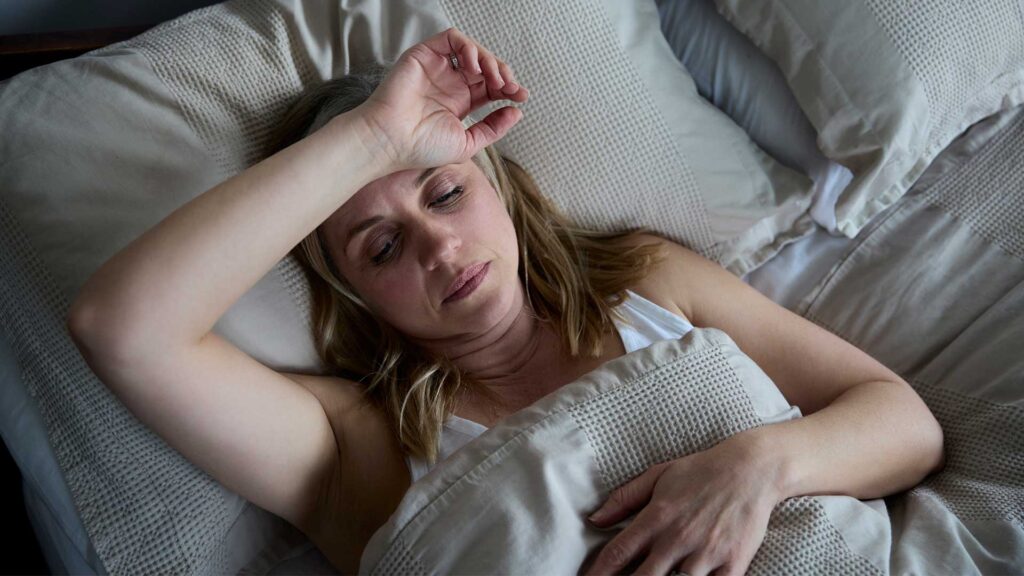Welcome to a stage in life where hormonal shifts can bring about a variety of changes, including the often frustrating and disruptive symptom of insomnia. Perimenopause, the transitional phase leading up to menopause, can be accompanied by sleep disturbances that impact your overall well-being. In this blog, we’ll explore the challenges of insomnia during perimenopause and discuss effective strategies and insomnia perimenopause treatments to help you reclaim a restful night’s sleep.
Contents
What Are The Challenges Of Insomnia During Perimenopause?
 Insomnia during perimenopause can pose a range of challenges that affect a woman’s physical health, emotional well-being, and overall quality of life. Here are some of the key challenges associated with insomnia during this transitional phase:
Insomnia during perimenopause can pose a range of challenges that affect a woman’s physical health, emotional well-being, and overall quality of life. Here are some of the key challenges associated with insomnia during this transitional phase:
- Hormonal Fluctuations
Perimenopause is characterized by significant hormonal changes, particularly fluctuations in estrogen and progesterone levels. These hormonal shifts can disrupt the body’s natural sleep-wake cycle, leading to difficulty falling asleep and staying asleep.
- Hot Flashes and Night Sweats
Many women in perimenopause experience hot flashes and night sweats, which can be particularly disruptive to sleep. Sudden bursts of heat can awaken individuals, making it challenging to achieve deep, restorative sleep.
- Anxiety and Mood Changes
Hormonal imbalances can contribute to increased anxiety and mood swings during perimenopause. Insomnia often exacerbates these emotional challenges, creating a cycle where sleep difficulties and emotional well-being are interconnected.
- Physical Discomfort
Changes in hormonal levels can also lead to physical discomfort, such as joint pain and muscle aches. Discomfort may make it difficult for women to find a comfortable sleeping position, further contributing to insomnia.
- Sleep Architecture Changes
Perimenopause can alter the structure of sleep, affecting the proportion of time spent in different sleep stages. These changes may result in less restorative sleep, leaving individuals feeling fatigued and less able to cope with daily activities.
- Cognitive Impairment
Chronic insomnia during perimenopause can lead to cognitive impairment, affecting memory, concentration, and decision-making. This can impact daily functioning and contribute to increased stress and frustration.
- Impact on Relationships
Sleep disturbances can affect not only the individual experiencing insomnia but also their relationships. Partners may be disrupted by frequent awakenings, and the resulting fatigue can strain communication and emotional intimacy.
- Daytime Fatigue and Impaired Functioning
The cumulative effect of disrupted sleep can result in daytime fatigue and impaired functioning. Women may find it challenging to meet work demands, participate in social activities, or enjoy hobbies due to persistent tiredness.
Understanding these challenges is crucial for developing effective strategies and seeking appropriate support to manage insomnia during perimenopause.
What Are Some Insomnia Perimenopause Treatments?
 Insomnia perimenopause treatments involve a combination of lifestyle adjustments, behavioral interventions, and, in some cases, medical treatments. It’s important to consult with a healthcare professional to determine the most appropriate treatment plan based on individual symptoms and health considerations. Here are some insomnia perimenopause treatments:
Insomnia perimenopause treatments involve a combination of lifestyle adjustments, behavioral interventions, and, in some cases, medical treatments. It’s important to consult with a healthcare professional to determine the most appropriate treatment plan based on individual symptoms and health considerations. Here are some insomnia perimenopause treatments:
Hormone Replacement Therapy (HRT)
Hormone Replacement Therapy involves the use of estrogen and sometimes progesterone to alleviate the symptoms of hormonal fluctuations during perimenopause. While it can be effective in addressing insomnia by stabilizing hormone levels, the decision to pursue HRT should be made in consultation with a healthcare professional. The benefits of HRT, such as improved sleep, should be carefully weighed against potential risks, including an increased risk of certain cancers and cardiovascular issues.
Cognitive Behavioral Therapy for Insomnia (CBT-I)
Cognitive Behavioral Therapy for Insomnia is a structured, evidence-based approach that focuses on changing thought patterns and behaviors related to sleep. CBT-I helps individuals identify and address the root causes of insomnia, promoting healthier sleep habits. It often includes techniques like sleep restriction, stimulus control, and cognitive restructuring. CBT-I is considered a first-line treatment for insomnia during perimenopause due to its effectiveness and the absence of side effects associated with medications.
Sleep Medications
Short-term use of sleep medications may be considered when insomnia is severe and significantly impacts daily functioning. However, these medications should be used cautiously and under the guidance of a healthcare provider. They are typically prescribed for brief periods due to the risk of dependence and potential side effects. Over-the-counter options, such as antihistamines, may also be considered, but their efficacy and safety should be discussed with a healthcare professional.
Regular Exercise
Regular physical activity has been shown to positively impact sleep patterns. Engaging in moderate-intensity exercise, such as brisk walking or swimming, for at least 30 minutes most days of the week can contribute to better sleep. However, it’s advisable to avoid vigorous exercise close to bedtime, as it may have a stimulating effect. Exercise not only promotes physical health but also helps manage stress and anxiety, common contributors to insomnia during perimenopause.
Mind-Body Techniques
Incorporating mind-body techniques into a daily routine can be particularly beneficial for managing insomnia during perimenopause. Mindfulness meditation, deep breathing exercises, and progressive muscle relaxation are practices that help calm the mind and reduce anxiety. By fostering a state of relaxation, these techniques can make it easier to transition into a restful sleep. Consistent practice, especially before bedtime, can contribute to improved sleep quality over time.
Dietary Changes
Making strategic dietary changes can play a role in addressing insomnia. Avoiding stimulants such as caffeine and nicotine in the hours leading up to bedtime is essential, as these substances can interfere with the ability to fall asleep. On the other hand, incorporating sleep-promoting foods can be helpful. Foods rich in tryptophan, such as turkey, dairy products, and nuts, may contribute to the production of serotonin and melatonin, hormones that regulate sleep.
Herbal Supplements
Herbal supplements are another avenue to explore for alleviating insomnia symptoms during perimenopause. Natural remedies like valerian root, chamomile tea, or passionflower extracts are believed to have mild sedative effects. However, it’s crucial to consult with a healthcare provider before using these supplements, as they can interact with medications and may not be suitable for everyone. Understanding potential risks and benefits is essential for safe and effective use.
Acupuncture
Acupuncture, an ancient Chinese healing practice, involves inserting thin needles into specific points on the body to stimulate energy flow. Some studies suggest that acupuncture may positively impact sleep quality and alleviate insomnia symptoms. While the evidence is not conclusive, many individuals find acupuncture to be a complementary therapy that promotes relaxation. As with any alternative treatment, it’s advisable to discuss its potential benefits and limitations with a qualified healthcare professional.
Supportive Therapies
Emotional support is crucial during the challenging phase of perimenopause, and seeking therapy or participating in support groups can be beneficial. Therapists can provide coping strategies for managing stress and anxiety, which can contribute to improved sleep. Additionally, sharing experiences with others going through similar challenges in a support group setting can provide a sense of community and understanding. Emotional well-being is closely tied to sleep, and addressing both aspects can contribute to a more holistic approach to insomnia management.
Remember, individual responses to these treatments can vary. Hence, it may take some time to find the most effective combination for managing insomnia during perimenopause. Consulting with a healthcare professional ensures personalized guidance and a tailored approach that considers individual health history and preferences.
What Are Some Sleep Hygiene Tips To Help?
 Sleep hygiene refers to a set of practices and habits that promote good sleep quality and contribute to overall well-being. Here are some tips that can be particularly helpful during perimenopause:
Sleep hygiene refers to a set of practices and habits that promote good sleep quality and contribute to overall well-being. Here are some tips that can be particularly helpful during perimenopause:
- Maintain a Consistent Sleep Schedule: Go to bed and wake up at the same time every day, even on weekends. Consistency reinforces your body’s natural circadian rhythm, making it easier to fall asleep and wake up naturally.
- Create a Relaxing Bedtime Routine: Establish a calming pre-sleep routine to signal to your body that it’s time to wind down. This could include activities such as reading a book, taking a warm bath, or practicing relaxation techniques like deep breathing.
- Optimize Your Sleep Environment: Ensure your bedroom is conducive to sleep. Keep the room cool, dark, and quiet. Invest in comfortable bedding and a supportive mattress. Consider using blackout curtains and earplugs if needed.
- Limit Screen Time Before Bed: Reduce exposure to screens (phones, tablets, computers, and TVs) at least an hour before bedtime. The blue light emitted from screens can interfere with the production of melatonin, a hormone that regulates sleep.
- Limit Naps: If you need to nap during the day, keep it short (20-30 minutes) and avoid napping late in the afternoon. Long or late-day naps can interfere with nighttime sleep.
- Be Mindful of Alcohol: While alcohol may initially help you relax, it can disrupt the later stages of sleep. If you choose to drink alcohol, do so in moderation and avoid it close to bedtime.
- Seek Natural Light Exposure: Exposure to natural light during the day helps regulate your body’s internal clock. Spend time outdoors, especially in the morning, to help maintain a healthy sleep-wake cycle.
- Consider Sleep Aids Carefully: If you’re considering over-the-counter sleep aids or supplements, consult with a healthcare professional first. While they may be helpful in some situations, it’s important to use them cautiously and under guidance.
By incorporating these sleep hygiene tips into your routine, you can create an environment that supports restful sleep, making it easier to manage insomnia during perimenopause. Consistency is key, so be patient and allow time for these habits to positively impact your sleep quality.
Conclusion
In conclusion, insomnia perimenopause treatments require a holistic approach that addresses the multifaceted challenges posed by hormonal fluctuations. From understanding the intricacies of perimenopause and its impact on sleep to implementing tailored lifestyle adjustments, and behavioral interventions, and, when necessary, seeking medical guidance, this journey is about reclaiming restful nights and overall well-being.
By incorporating sleep hygiene practices, women can empower themselves to manage perimenopausal insomnia. Remember, there’s no one-size-fits-all solution. Therefore, seeking professional advice ensures a personalized and effective strategy. Through shared experiences, education, and a commitment to self-care, women can navigate this transformative phase with resilience. If you are facing menopause related issues, menopause treatment at HerMantra can help. Book your free trial online menopause treatment session now.


